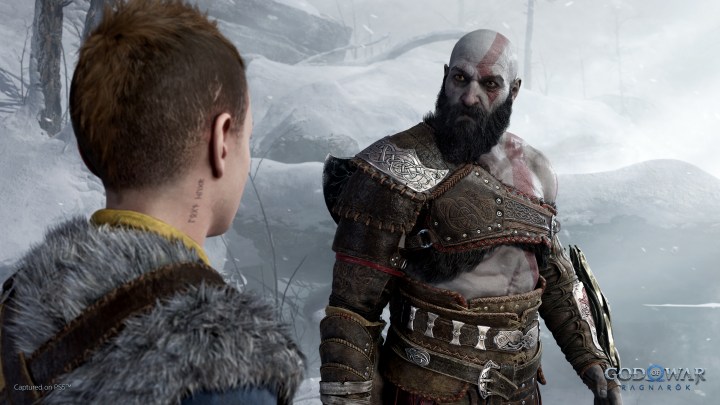In the past few years, I’ve become the type of girl who looks forward to The Game Awards more than the Academy Awards. This year, however, is a little bit different. As host Geoff Keighley announced this year’s nominees, I hoped to see Sonic Frontiers get a bit of recognition. While mixed reviews meant it was unlikely to compete for Game of the Year, it felt like a potential shoo-in for categories like Best Action/Adventure Game. Instead, Sonic’s latest didn’t earn any nominations, not even for its critically praised soundtrack.
While Sonic’s lack of nominations makes sense considering its overall reception, it’s indicative of a wider trend that tends to pop up at events like this. Kirby and the Forgotten Land, which came out in March to critical acclaim, only managed to nab a Best Family nomination. Like previous years, even Nintendo’s most well-regarded games were tossed into that category — even ones that were reviewed better than some of the titles competing for Game of the Year.
None of this is a Game Awards issue; the institution is simply inheriting the attitude of the industry that participates in it. More and more, it feels like games aren’t getting top-level recognition unless they fit into a “mature” mold. That’s leaving E-rated titles that aim to suit all ages struggling to be seen on the same level, giving the video game industry its own version of the Oscars’ animation bias.
All-ages games should be equal to mature games
Just like animated films, there’s absolutely nothing wrong with playing games that carry the E-rating. They’re totally appropriate for children 12 and younger and a source of relaxation for most adults, even when we’re old enough to play Mature-rated games. Plenty of great games released this year nailed that approach, creating experiences that layered surprising thematic depth into something for players young and old.
Despite its lack of a deep story, Kirby and the Forgotten Land has mature themes woven into its lore. The backstory regarding the Forgotten Land implies that its postapocalyptic state came to be because greedy energy companies destroyed it. Lab Discovera is one such energy company, and the captured Waddle Dees were seen running in hamster wheels to power the facility even after it had been abandoned, providing a comedic but effective critique of capitalism in-between colorful platforming stages.

Sonic Frontiers spotlights its characters’ growth in what has otherwise been called a static franchise. As they work together to uncover the mystery of the Ancients, Sonic and the gang resolve to become their own people. Tails, for instance, wants to step out of Sonic’s shadow and go on his own adventures, while Amy outgrows her fangirlish infatuation with Sonic and focuses on spreading love to the world. They’re complex character beats that draw from decades of series history.
This year also saw some key rereleases that remind us that all-ages games have always strived to deliver more than kid-friendly escapism. Klonoa Phantasy Reverie Series, a compilation of remakes from the original Klonoa duology, discusses mental health (and emotional maturity) in a way that is endearing to both kids and adults. As Gaming writer De’Angelo Epps wrote earlier this year, the bosses that Klonoa encounters in each game teach us that we can’t ignore negative emotions no matter how painful they are, as they are just as much an important part of life as positive ones are, and to disregard such emotions otherwise breeds toxic positivity.
The themes that these all-ages games present to players, regardless of their age, make them just as valuable as their mature counterparts. They can cover similar topics as A Plague Tale: Requiem or God of War: Ragnarok, but in terms younger players can understand without watering down the context.
A bias inherited from Hollywood
E-rated games being overlooked in favor of Mature-rated games at ceremonies like The Game Awards is nothing new; it’s the same thing has happened at the Oscars vis-à-vis animated films being passed over in favor of traditional, live-action films.
Since The Game Awards’ inception eight years ago, Mature-rated games have outnumbered all-ages games for Game of the Year nominations by more than 3 to 1. The only all-ages game that won Game of the Year was The Legend of Zelda: Breath of the Wild in 2017, when no “mature” games were nominated for the award at all. Other than that, six M-rated games have won Game of the Year overall, including The Last Of Us Part II, Sekiro: Shadows Die Twice, God of War, The Witcher 3: Wild Hunt, and Dragon Age: Inquisition.

That dynamic is reminiscent of the movie industry and its complicated relationship with animated films. Though the Oscars has a Best Animated Feature category that largely celebrates films by Disney and Pixar, few of those films have ever gotten to compete for Best Picture (2009’s Up being an exception). That builds the impression that all-ages animation is a side genre made only for children rather than a cinematic medium worthy of widespread acclaim.
The Game Awards has its own version of that with its Best Family Game category, which often feels like a consolation prize for Nintendo. Though the division is more noticeable this year due to how high-quality the field of potential nominees for the category are this year. When critically beloved titles like Kirby and the Forgotten Land still feel like they aren’t enough to compete at a top level, it’s worth examining what we value in the games we celebrate, lest the gaming industry repeat the mistakes of Hollywood.
Editors’ Recommendations
Stay connected with us on social media platform for instant update click here to join our Twitter, & Facebook
We are now on Telegram. Click here to join our channel (@TechiUpdate) and stay updated with the latest Technology headlines.
For all the latest Gaming News Click Here
